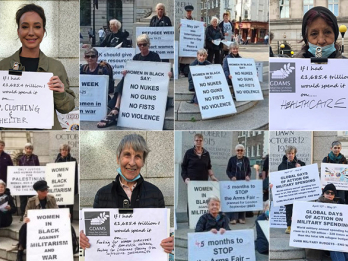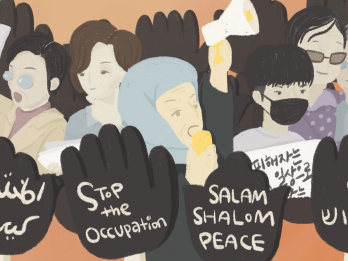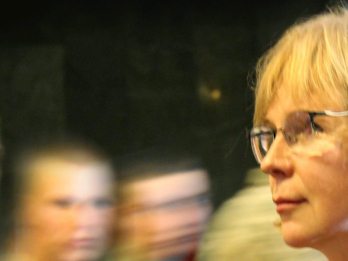Encountering Palestinian Women Who Stand Tall Amid Daily Crisis and Violence
#1. Institutionalized, Arbitrary Arrest and Detention: The Story of Maysar, a Female Farmer Activist
On September 25, 2024, at 6 a.m., even before sunrise, 15 heavily armed Israeli soldiers raided the home of Maysar, an organizer of a Palestinian women farmers’ group living in Nablus, a city near the Jordan River in the West Bank. The soldiers woke all family members and forced them into the living room. Soon after, they took Maysar, a 60-year-old woman with a visual impairment, into another room, where they handcuffed and blindfolded her. When her family strongly protested, the soldiers removed the blindfold but still dragged her outside without providing any explanation for the arrest. Outside the house, four Israeli military vehicles were parked, and dozens of soldiers stood guard around the perimeter.
After being arrested by the Israeli military, Maysar was held in detention without being allowed any visits from her family. Later, through a lawyer, her family was informed that the official reason for her arrest was that she was deemed a “threat to Israeli security.” Her family and friends held protests demanding her immediate release and continued campaigning for the freedom of Maysar and other Palestinian activists detained on similar charges. Four months later, on January 20, 2025, Maysar was released and reunited with her family as the first phase of the ceasefire between Israel and Hamas came into effect. However, following Israel’s unilateral breach of the ceasefire and resumed attacks on March 18, she once again lives in fear, uncertain of when she might be taken away again.
As of May 2025, 147 out of 193 UN member states recognize Palestine as an independent state. Yet, Palestine lacks defined borders, airports, and seaports. It has no national currency, nor does it issue its visas. Entry into Palestine requires passing through Israeli-controlled borders, but Israel denies entry to those seeking to visit the region or meet with residents. Parcels cannot be delivered to Palestine, and it cannot independently import or export goods; all goods must go through Israeli customs. Nevertheless, Israel collects and manages taxes from Palestinians.
Palestine has a police force that handles traffic and public safety, but it has no military. Instead, the Israeli military can arrest and detain Palestinians at any time without a warrant, as in the case of Maysar. Even when Israeli soldiers kill Palestinian women, children, or young people, they are not held accountable. The United Nations designates the region as the “Occupied Palestinian Territories (OPT).” Although Palestine is internationally recognized as a state, the reality of Palestine is akin to that of Korea under Japanese colonial rule.
#2. Gender-based Violence Difficult to Expose Due to Cultural Characteristics: The Story of Rana, a Young Woman
Rana, the eldest of four siblings, was raised in a middle-class Palestinian family. Influenced by parents who valued education, she majored in Arabic at university and went on to work as a teacher at a public school in Nablus. Her nightmare began when, at age 24, despite having a good relationship with her family, she came under increasing pressure from her parents to marry, even though she wished to pursue additional studies while working. Unable to resist, Rana attended a blind date arranged by a relative. The man, 17 years her senior with a child from a previous marriage, criticized her clothing and lectured her on proper feminine conduct during their first meeting. Moreover, he made unwanted physical contact, amounting to clear sexual harassment. When Rana shouted for him to stop, he raised his voice, accusing her of provoking him. Rana stormed out of the meeting and declared her refusal to marry him, without disclosing the harassment to her parents. Since then, communication with her family has ceased. The man tracked down her social media account and has continued to send disturbing photos and videos. Struggling with anxiety and severe depression, Rana even attempted suicide. She is currently receiving psychiatric treatment.
ADI, which conducted human rights investigations in Palestine between 2018 and 2019, reported the remarks of a local female activist at the time: “In Palestine, gender-based violence is as serious an issue as the Israeli occupation. However, due to cultural norms, it’s extremely difficult to speak out. Even when the #MeToo movement was gaining global momentum, Palestine remained largely silent. This is because discussing gender-based violence is taboo, and people are reluctant to disclose such matters to outsiders.” According to a 2023 report by UN Women, 59.3 percent of Palestinian women have experienced violence from their husbands. The most common form was psychological violence (57%), followed by economic violence (20.5%), physical violence (18.5%), and sexual violence (9%). Furthermore, data from the Palestinian Central Bureau of Statistics (PCBS) in 2022 reveals a stark gender gap: while women attain higher levels of education than men, their labor force participation rate is just one-third that of men, and their employment rate is only one-fifth. These figures underscore the severity of gender-based violence in Palestine and point to the deeply entrenched structural discrimination faced by women in Palestinian society.
#3. Children Starving While Aid Trucks Stand Idle: The Story of Nirveen, a Mother in a Humanitarian Catastrophe
Nirveen, who has spent years providing aid to women and children in the Gaza Strip with ADI, now leaves home every morning in search of food. As of May 13, two months after Israel blocked all humanitarian supplies from entering Gaza on March 2, 2025, food nearly ran out. That day, she and her colleague wandered the streets of downtown Gaza for over an hour, never to find a single store open. Returning home empty-handed, Nirveen was gripped by fear that she might soon lose her increasingly frail six-year-old son, Ahmed, her third child.
Nirveen had already lost her youngest son, Adam. On October 7, 2023, when Adam was just four months old, Hamas launched an attack on Israel. In response, Israel unleashed hundreds and thousands of tons of missiles and bombs, turning Gaza into rubble. It then cut off not only electricity and fuel but also water, food, and medicine needed in Gaza. Adam had been born with digestive issues and required a special infant formula called PediaSure. However, due to Israel’s blockade on supplies, the formula soon ran out. When Adam reached seven months old, there was no suitable food left. After struggling for a month, Adam died at nine months old in February 2024 from malnutrition and dehydration. Even a year later, seeing her six-year-old son Ahmed grow weaker with each passing day, Nirveen and her family’s hearts remain shattered.
As of May 28, 2025, it had been 600 days since Israel launched its military offensive. Many media outlets still refer to the conflict as the “Israel-Hamas War” or the “Gaza War,” yet such labels fail to fully reflect the reality unfolding in the Gaza Strip. According to the Gaza Health Ministry, as of May 28, the death toll had reached 54,056, with 123,129 injured, out of a population of 2.3 million. When those reported missing are included, the number of deaths exceeds 61,700. More than 100 civilians are killed each day by Israeli attacks. Unless these military offensives and the blockade cease, this tragedy will persist—and 70 percent of the victims are women and children. International bodies, including the UN Human Rights Office, the International Court of Justice (ICJ), and the International Criminal Court (ICC), have unanimously condemned Israel’s military attacks as “genocide” and “war crimes” against the civilian population of Gaza. Yet, no international institution or state has succeeded in halting Israel’s assault.
Even more heartbreaking is the reality that what threatens the lives of Gaza’s 2.3 million residents is not only Israeli military assaults, but also the unbearable suffering brought on by the absence of basic survival necessities—compounded by hunger, illness, infectious disease, drought, and extreme heat. Shockingly, the problem is not the absence of supplies themselves. Thousands of trucks loaded with essential goods line up at Gaza’s entry points, but Israel’s blockade prevents them from being delivered. As in Nirveen’s case, parents fear their children will starve to death, while children who have lost their families cling to the edge of life in despair and terror. Gaza is now gripped by a horrific reality so severe that even the term “humanitarian catastrophe” fails to capture its full extent.
#4. Denouncing the “Nakbacatastrophe” That Fuels Gender-based Violence: ADI’s Story of Solidarity and Documentation
Founded in 2016, ADI is a non-governmental organization dedicated to restoring human rights in conflict-affected regions across Asia. The name “ADI” is both an acronym for Asian Dignity Initiative and inspired by the pure Korean word “aditjul,” meaning the rope that secures a sail and symbolizing the organization’s commitment to steering the sails of human rights, peace, and development in the right direction throughout Asia. From its inception, ADI has recognized the human rights violations resulting from Israel’s military occupation of Palestine and has consistently carried out field visits and documentation efforts. Understanding that not only Occupation Related Violence (ORV) but also gender-based violence are critical issues in Palestine, ADI has published the “Palestine Women’s Human Rights Report” annually since 2020. In that same year, ADI launched the “Palestinian Women’s Support Center” to protect the rights of women affected by violence and to empower them. As part of this effort, it introduced the “Speak-up” project, an independent media experiment aimed at training female journalists and creating a women-led online media platform. ADI has also engaged with numerous local women and women’s organizations, listening to their stories and sharing them with Korean society.
Many people believe the tragedy in Palestine stems from Hamas’s military attacks and hostage-taking. However, Palestinian women tell a different story. They trace the roots of the tragedy back to 1948 when Israel was established on Palestinian land—a time they refer to collectively as the “Nakba,” or “catastrophe.” They argue that Israel’s violence of occupation not only unleashed various forms of violence but also exacerbated gender-based violence within Palestinian society. At the time of Israel’s founding, thousands of Palestinians were killed, and 720,000 were displaced and forced to live as refugees. Through four subsequent wars in the Middle East, Israel colonized the majority of the land inhabited by Palestinians and institutionalized discrimination across legislative, judicial, and administrative systems.
In response, the Palestinian people launched the “intifada,” a popular uprising, and engaged in armed resistance. This eventually led to the 1993 signing of the Oslo Accords between Israel and Palestine, under the gaze of the international community, based on the principle of “land for peace.” The agreement appeared to offer limited autonomy to parts of Palestinian territory. However, Israel ultimately failed to implement the accords. Instead, it deepened its colonial control by dividing Palestinian land into the West Bank, East Jerusalem and the Gaza Strip. Israel pursued policies of territorial annexation and the forced expulsion of residents in the West Bank and East Jerusalem, while imposing a blockade and isolating Gaza. Israel also constructed hundreds of settlements in the West Bank and East Jerusalem, relocating hundreds of thousands of Israeli citizens, and launched four large-scale military assaults on Gaza. These developments planted the seeds of further tragedy: on October 7, 2023, Hamas fighters launched a surprise attack on Israel, killing approximately 1,200 people and taking 251 hostages.
Were it not for the violence of occupation, the lives of Palestinian women might not be so different from those of women in other societies shaped by entrenched patriarchal norms. Tragically, Israel’s war crimes, including the blockade of essential supplies, have driven Palestinian children into hunger and death, while entire families are repeatedly wiped out by unrelenting airstrikes. Meanwhile, the international community has long viewed Palestinian women as mere victims of religious oppression, seeing them only through the lens of Islam and failing to genuinely hear their voices.
However, Palestinian women’s appearances and stories that ADI encountered were different—difficult to capture in a single image or describe in a single narrative. As illustrated by the three stories above, even amid multiple, overlapping hardships, these women actively shared their experiences during the documentation process and continued to confront their reality with resilience. Maysar still reports to her job at the women’s farming organization, Rana gives voice to women’s experiences by sharing her own pain, and Nirveen sets out daily in search of food to keep her remaining children alive.
Furthermore, some women actively engage in women’s capacity-building programs and seek to change the structure of occupation and the patriarchal order imposed upon them. Among them is Shirin Zeidan, an activist at the Palestinian Women’s Support Center and participant in ADI’s “Speak-up” project—a female journalist training initiative launched in January 2024. Designed to equip local women with the expertise to identify social issues and lead human rights advocacy through journalism in a society long plagued by Israeli violence of occupation and gender-based violence, this project supported 25 women participants from April to October. They completed comprehensive media training, which covered foundational knowledge of journalism, news, and media; specific issues in politics, economics, gender, and culture; as well as practical skills including article writing and the operation of filming equipment. After completing the training, the participants demonstrated remarkable growth, producing six articles and six video reports, including an article titled “The Season of Olives: Israeli Settler Violence and Farmers’ Resilience” and a video report titled “Checkpoints and the Daily Lives of Palestinians: Dental Students in Palestine.” Below is an excerpt from Shirin’s testimonial reflecting on her experience in the project.
“The greatest achievement for me this year was completing the training despite the numerous obstacles and challenging security conditions I encountered in Nablus. (...) Throughout my life, I have carried an unwavering passion and energy for my work, yet I never had the chance to truly prove myself. At the Palestinian Women’s Support Center, I was granted my first real opportunity, and I vowed to wholeheartedly fulfill the responsibilities entrusted to me. I faced every challenge with resilience and determination, allowing nothing to hinder my growth. I remain fully committed to my role and deeply grateful for this invaluable opportunity.”
The stories of Palestinian women transcend mere cries of victimhood. They are narratives of survival and solidarity—of enduring and resisting occupation, oppression, and patriarchal structures, and of sustaining life for future generations. As long as they resist through their very existence, ADI will steadfastly document, convey, and stand in solidarity with their struggle.
Related contents
-
- “Stop Using Women’s Bodies as Battlefields!”
-
Iryna Dovhan, head of SEMA Ukraine, condemns the severe violence and suffering endured by countless women during the Ukraine-Russia war, which has persisted for over a decade.
-

- A Conversation with Sue Finch of Women in Black London (1)
-
As the history of Women in Black shows, each Women in Black group has its own approach to feminist action, growing out of their local situation, but linked to each other through international theories and conferences.
-

- Women’s Solidarity in Our Troubled Times of Gendered Violence and War
-
The Research Institute on Japanese Military Sexual Slavery organized an interview between philosopher Rada Iveković and anthropologist Young-Gyung Paik.
- Writer Lee Dong-hwa
-
He is the representative activist of “ADI,” Korea’s first non-profit organization dedicated to supporting conflict-affected regions in Asia. His human rights work in conflict zones began in 2003 through participation in the Anti-War and Peace Team for Iraq. Subsequently, he studied Arabic at the University of Jordan and deepened his commitment to international solidarity through visits to Palestine. After a decade of managing international affairs at Lawyers for a Democratic Society, he founded “ADI” in 2016 and has been actively engaged ever since.
